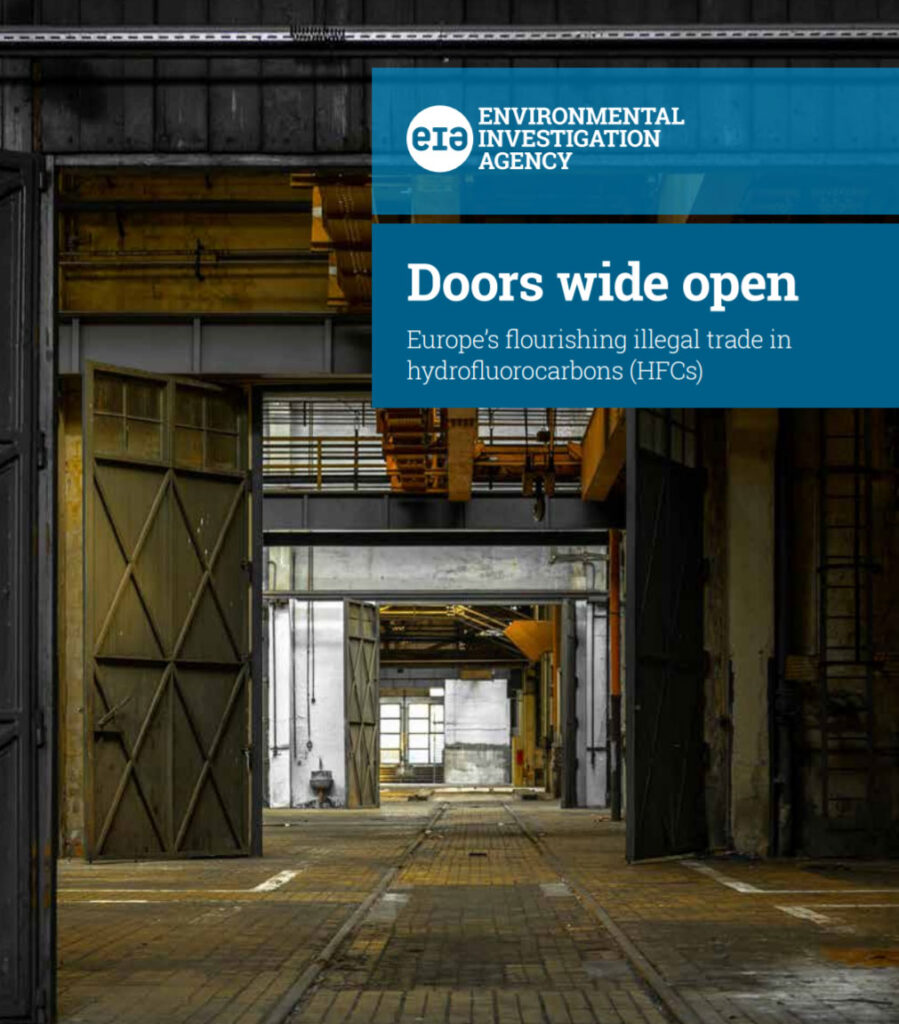EIA shines a light on illegal refrigerant
- PostedPublished 30 June 2019
Doors Wide Open, a report recently published by the Environmental Investigation Agency (EIA), has showcased how the illegal refrigerant trade is flourishing in Europe.
The detailed report reveals customs figures that indicate up to 16.3 million tonnes of CO2-equivalent HFCs made it into Europe illegally in 2018 – a figure equivalent to 16.1 per cent of the available quota.
It also highlights how current HFC reporting systems are riddled with loopholes, while noted discrepancies between European import and Chinese export data could be indicative of fraudulent import declarations.
The EIA’s report further explains that few penalties have been levied against those violating the rules, resulting in reduced deterrence. This issue is compounded by the revelation that fines actually enforced are often low, meaning they frequently prove moot to those who will otherwise make significant profits from illegal trades.
A lack of enforcement, which has been criticised before, is claimed to be one of the major driving forces behind the rising trade in refrigerants on the black market.
The European Fluorocarbons Technical Committee (EFCTC) has welcomed the report, stating: “This report complements the work that is being carried out by EFCTC in raising awareness on this issue and its consequences.”
EFCTC chairman Nick Campbell said: “The European Union is leading the global phase-down of HFCs and must maintain this lead and demonstrate to other countries that the actions it is taking are compatible with maintaining the health and social benefits provided by refrigeration, air-conditioning and insulation industries. Clearly, illegal imports of HFCs undermine this goal.”
Recent reports of illegal HFC seizures reinforce the magnitude of the issue. A news story from the EIA confirmed that Polish authorities had seized almost 25 tonnes of illegal refrigerant – including disposable cylinders of R410a, R404A and R134a. These refrigerants reportedly had a value of more than $A980,000.

Beyond the potential environmental costs are uncollected taxes and fees for illegally imported refrigerants that are reported to exceed $A11 million.
Clare Perry, the EIA’s Climate Campaigns leader, said: “We commend the Polish authorities for this seizure, urge them to apply penalties that will deter future illegal traders and look to other EU member states to step up enforcement against this pernicious criminal trade.”
It is not only countries that are bearing a financial brunt. Refrigerant manufacturer Chemours reported a drop in profits for the first quarter of 2019, which it partially attributed to the effect of illegal refrigerant imports in Europe on its sales.
Countless smaller illegal imports are also stacking up. In April, customs officials at the Bulgarian-Turkish border intercepted a truck carrying more than a tonne of illegal single-use cylinders into Bulgaria.
The 96 tanks, according to a story published by specialist outlet Cooling Post, totalled 1123kg and consisted of R134a and R404a.
Many disposable refrigerants also remain easily available online, from outlets such as eBay and Facebook Marketplace, despite repeated reporting of these illegal products – with a cursory search quickly revealing disposable cylinders of R134a, R32 and R404a.
It is not, however, only individuals or small groups that are responsible for this illegal trade. In Spain, the Civil Guard reported it had uncovered evidence that a Valencia-based refrigeration company had illegally exported more than nine tonnes of R22. According to the investigation, which was coordinated by the European law enforcement agency Europol, ten people were directly involved in the smuggling operation.
The Spanish refrigeration and technologies organisation AEFYT subsequently published a statement outlining a need for improved customs control and sanctions, in order to help cease the flow of illegal refrigerant.
“The control of the borders is what has helped Civil Guard expose the illegal export and irregular management as hazardous waste of about 10 tons of R22 by a company located in Valencia, which claimed to export them to Panama as regenerated gases,” stated AEFYT. “Other measures that we support are to demand the improvement of HFC surveillance systems in exporting countries, the prohibition of the use of non-disposable cylinders and the improvement of transparency in the quota system.”
Fortunately, new systems such as the Illegal Trade Action Line – which was announced by the EFCTC in March – should help counter some illegal trade.
This confidential and independent point of contact allows individuals who suspect underhand activities to report them safely, allowing authorities to set about collecting evidence and deal with the situation at hand effectively. So far, the EFCTC says that over 50 reports have been submitted.
Government bodies, however, are still drawing flak for their seemingly lax response to the illegal refrigerant trade.
Only a few months ago, Lithuanian MEP Rolandas Paksas criticised the European Commission (EC) for failing to take meaningful interim action against what was obviously a serious and seemingly increasingly commonplace occurrence.
Jo Leinen, a Member of the European Parliament from Germany, has also now asked why the EC is seemingly unresponsive to the issue.
In a written question, he said: “The burgeoning illegal trade in refrigerants — which are mainly exported from Asia — is jeopardising the goals of the F-Gas Regulation.
“Is it [the EC] cooperating with national authorities and seeking to better enforce customs checks? Will it seek to work with its Asian counterparts to identify and track exports of refrigerants destined for the EU market?”
The net impression was one of a clear lack of communication and response from the EC about the ongoing issues, despite the potential for the growing illegal trade to counter the goals of the F-gas regulations.
However, the EC later downplayed the significance of the issue at a refrigeration and air-conditioning conference in Italy.
A story published by Cooling Post stated that Niccolò Costantini, the policy officer in the climate change sector at the EC, claimed that the illegal trade was “modest” and that the import of these cylinders and refrigerants would not harm overall environmental goals.
Costantini did however point out that many states were taking action, such as removing illegal online sales and improving checks at borders.
He also highlighted the fact that the countries involved were “principally responsible” for tackling illegal trade and enforcing the regulations – and that, if a member of the EC should appear to not be taking sufficient action, “infringement procedures” may be taken.
- CategoriesIn SightGlass
- TagsIllegal refrigerant, illegal refrigerants, SightGlass News Issue 17


